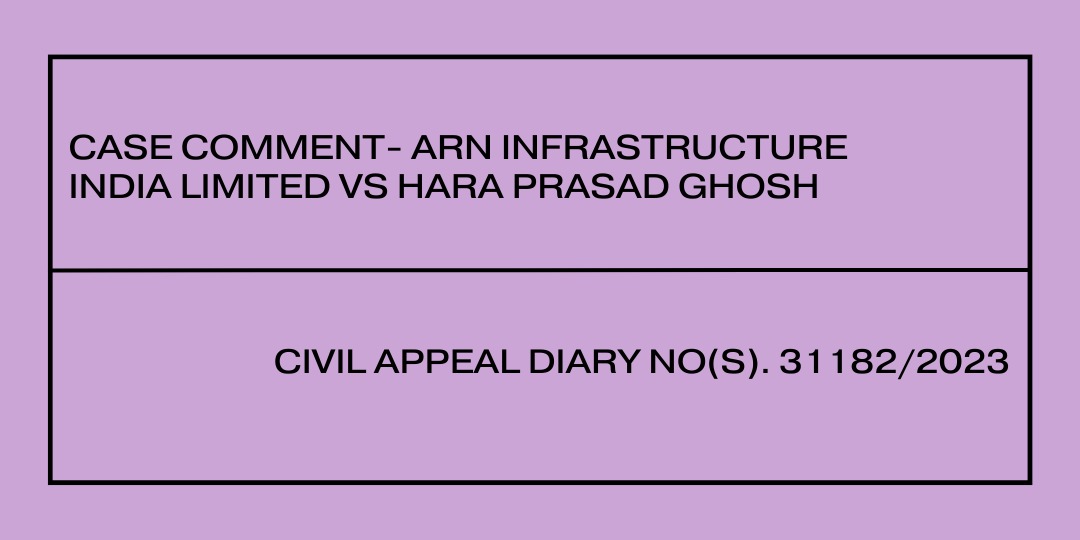CASE COMMENT- ARN infrastructure India Limited vs Hara Prasad Ghosh: CIVIL APPEAL Diary No(s). 31182/2023

T.G Niranjana – Associate, Dispute Resolution Practice
Brief facts:
A complaint under original jurisdiction was filed before the NCDRC seeking return of deposit from the Opposite Parties. In the said case, the Opposite Parties did not file their Written Version within the statutory timeline prescribed. While so, at the time of hearing final arguments, the Opposite Parties entered appearance through an advocate and sought an adjournment to make final arguments in the case.
The NCDRC rejected the said request on the ground that the Written Version was not filed within the statutory period. The NCDRC allowed the complaint by hearing only the Complainant on merits. An application was filed by the Opposite Parties to recall the aforesaid order. The said application was also dismissed by the NCDRC against which a civil appeal was filed before the Hon’ble Supreme Court which is under discussion here.
Issue and ratio:
The issue before the Hon’ble Supreme Court was whether the Opposite Parties are entitled to make final arguments even when the Written Version was not filed. The Hon’ble Supreme Court held that the Opposite Parties have a right to make final arguments even if the Written Version was not filed. The Apex Court observed that hearing only the Complainant on merits when the Opposite Parties intended to make submissions is violative of the principles of natural justice.
Analysis:
- The judgment is of great importance in the current scenario because most of the consumer commissions set the Opposite Parties ex-parte immediately upon non-filing of the Written Version. In some cases, the Opposite Parties are denied the right to participate in the proceedings even if an express order setting them ex-parte is not passed. The Consumer Commissions, in those cases, seem to justify such orders from section 38(3) which talks about the procedure on admission of complaints. The said section is reproduced as hereinbelow:
“(3) The District Commission shall, if the complaint admitted by it under sub-section (2) of section 36 relates to goods in respect of which the procedure specified in sub-section (2) cannot be followed, or if the complaint relates to any services,—
(a) refer a copy of such complaint to the opposite party directing him to give his version of the case within a period of thirty days or such extended period not exceeding fifteen days as may be granted by the District Commission;
(b) if the opposite party, on receipt of a copy of the complaint, referred to him under clause (a) denies or disputes the allegations contained in the complaint, or omits or fails to take any action to represent his case within the time given by the District Commission, it shall proceed to settle the consumer dispute—
(i) on the basis of evidence brought to its notice by the complainant and the opposite party, if the opposite party denies or disputes the allegations contained in the complaint, or
(ii) ex parte on the basis of evidence brought to its notice by the complainant, where the opposite party omits or fails to take any action to represent his case within the time given by the Commission;
(c) decide the complaint on merits if the complainant fails to appear on the date of hearing.
- The above extracted provision is interpreted in two ways, both having their own reasoning. The first and the most apparent interpretation is that if the Opposite Party omits or fails to file the Written Version within the time stipulated by the Tribunal, they shall be set ex parte. The other interpretation is that the case will be heard ex parte only when the Opposite Party does not enter appearance.
- The latter interpretation is arrived at by placing the emphasis on the phrase “any action to represent his case”. Thus, it is argued that only when the Opposite Party fails to take necessary steps to enter appearance, either in person or through an advocate, he fails to ‘represent’ the case and that is when the clause ought to be applied to set ex parte orders. On the other hand, those in favour of the former interpretation argue that the word ‘represent’ means ‘filing Written Version’. To strengthen this interpretation, they place the emphasis on the phrase “within the time given by the Commission”. They argue that the only time limit that the Commission is empowered to fix for an Opposite Party is the time to file the Written Version. By use of the words ‘within the time given by the Commission’ after ‘action to represent the case’, they say that the Legislature intended the filing of Written Version.
- The section 13(2)(b)(ii) of the Consumer Protection Act, 1986 (the old Act) was amended in 2003 whereby the words ‘on the basis of evidence’ have been substituted with the words ‘ex parte on the basis of evidence’. This specific amendment and its stated objective: ‘to plug the loopholes and make the Act more consumer friendly’ strengthen the interpretation that the Opposite Parties shall be set ex parte if the Written Version is not filed within the stipulated time. This subsection is verbatim reproduced under the section 38(2)(ii) of the New Act.
- Further, the Hon’ble Supreme Court, in the case of New India Assurance Co. Ltd. v. Hilli Multipurpose Cold Storage (P) Ltd., (2020) 5 SCC 757 : (2020) 3 SCC (Civ) 338 has confirmed that the time to file Written Version is mandatory. One of the main reasoning was that the consequence of non-filing of the Written Version is given under the Act which is to be set ex parte.
- It is pertinent to note that the section 38(5) of the New Act states that the proceedings under section 36(2) and (3) cannot be called in question on the ground that the principles of natural justice have not been complied with. In this scenario, comes the judgment under analysis here, stating that the Opposite Party has the right to make final arguments even in the event of failure to file the Written Version, and restricting such right would amount to violation of the principles of natural justice. It appears that the aforesaid judgment of the Hon’ble Supreme Court and the amendments in the Act were not brought to the notice of the Court in this case as there is no discussion or substantiation in favour of such an interpretation. We would have had more clarity if the Court had discussed the relevant provisions of the Consumer Protection Act and the distinction it makes from the judgment of the Constitutional Bench (2020) 5 SCC 757.
- The ruling plays a great role in achieving a level playing field in the consumer litigations. This is because the Opposite Parties in most of the cases are corporates with a centralised legal division in one place of the country and branch offices in almost every other state. The notices from the court are usually sent to the branch officers while the centralised legal department is tasked with the preparation/assisting in preparation of the Written Version. As trivial as this looks, and some may even discard it as ‘you problem’ criticising the corporates’ complicated hierarchy system, it is real that the corporates do not find sufficient time to collect all the information to defend themselves. Sometimes, the transactions are through corporate agents who possess most of the consumer specific data, such as the dealers for the manufacturers, the insurance agents for insurance companies, and collection of such data from various third parties require a considerable time. The hardship is grave when the Registry does not send the copy of documents filed in support of the complaint while sending the notice of complaint. While it is true that the Consumer Protection Act is a beneficial legislation and that the consumer cases must be disposed of expeditiously, the Legislature must note that a reasonable time is to be afforded to the Opposite Parties to defend their case, in the interest of justice. Until the Legislature takes note of such a difficulty faced, this judgment can fill the void.



